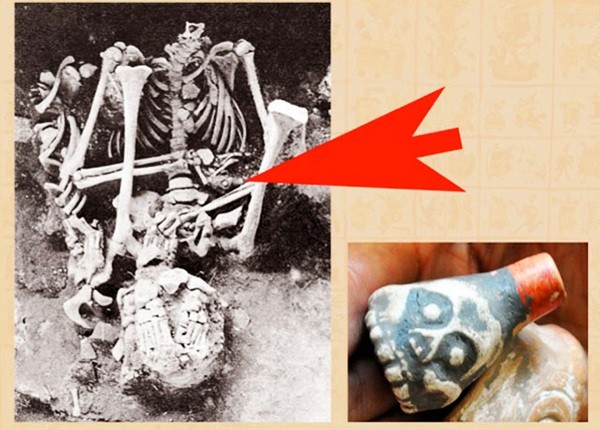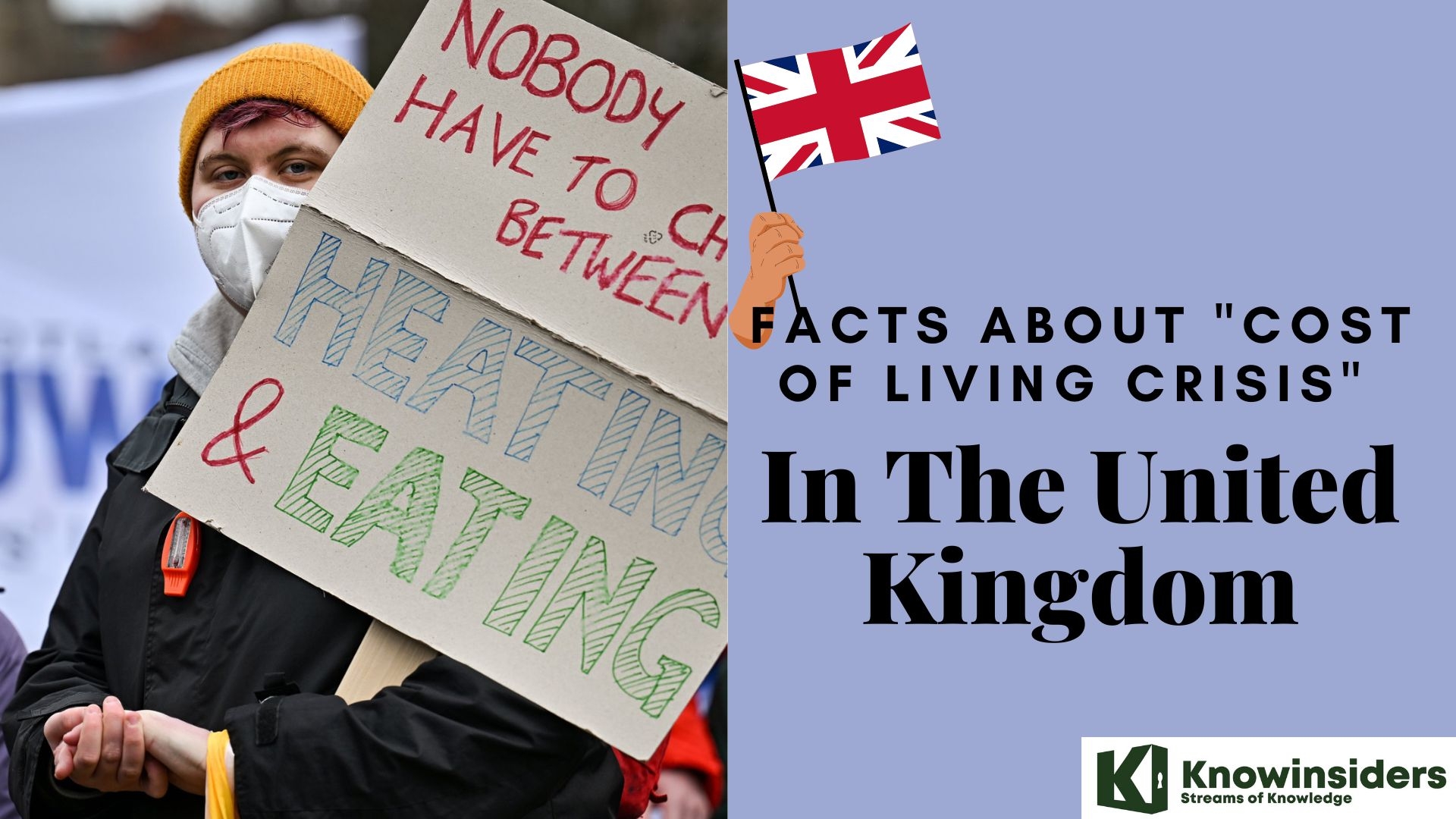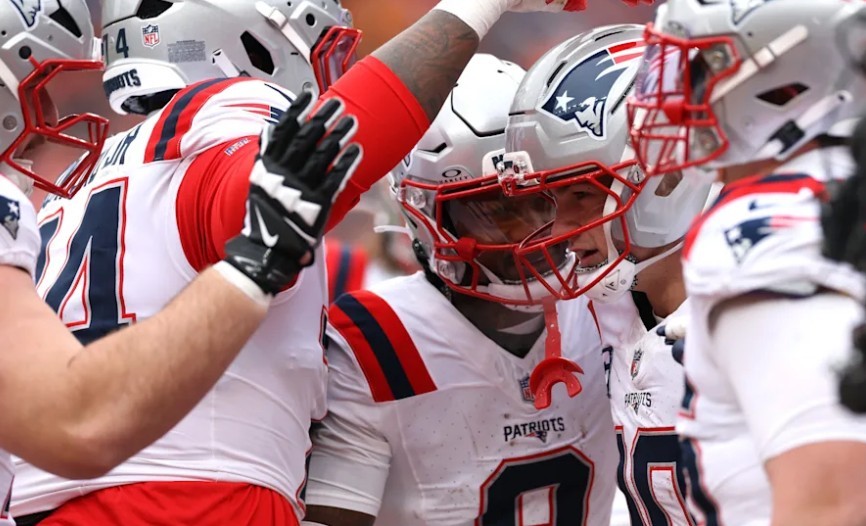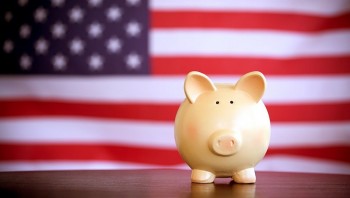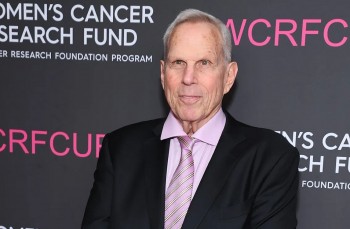Does Coffee Really Dehydrate You And How to Manage?
 |
| Photo: KnowInsiders |
Coffee is one of the most popular beverages in the world.
A major reason why people drink coffee is for its caffeine, a psychoactive substance that helps you stay alert and aids performance.
However, caffeine can be dehydrating, which may make you wonder whether drinking coffee hydrates or dehydrates you.
This article tells you whether coffee is dehydrating.
Coffee: A popular beverage
Whether you take your coffee black and piping hot or milky and iced, if you’re an avid coffee drinker, it’s probably part of your morning (and afternoon) routine.
A whopping 58 percent of Americans drink coffee to help them wake up, according to a 2021 report by the market research company Statista.
“From the aroma to the flavor of the first sip to the stimulating caffeine hit that coffee imparts, java has become a staple in the American lifestyle,” says Vicki Shanta Retelny, RDN, host of the “Nourishing Notes” podcast. “However, like everything, drinking too much coffee is not beneficial.”
So, how much coffee is too much? And can overindulging lead to dehydration?
Here, three experts break down the details of why coffee might send you to the bathroom, whether it can dehydrate you, and how to maximize the health benefits of this age-old breakfast favorite.
Does caffeine make you pee more?
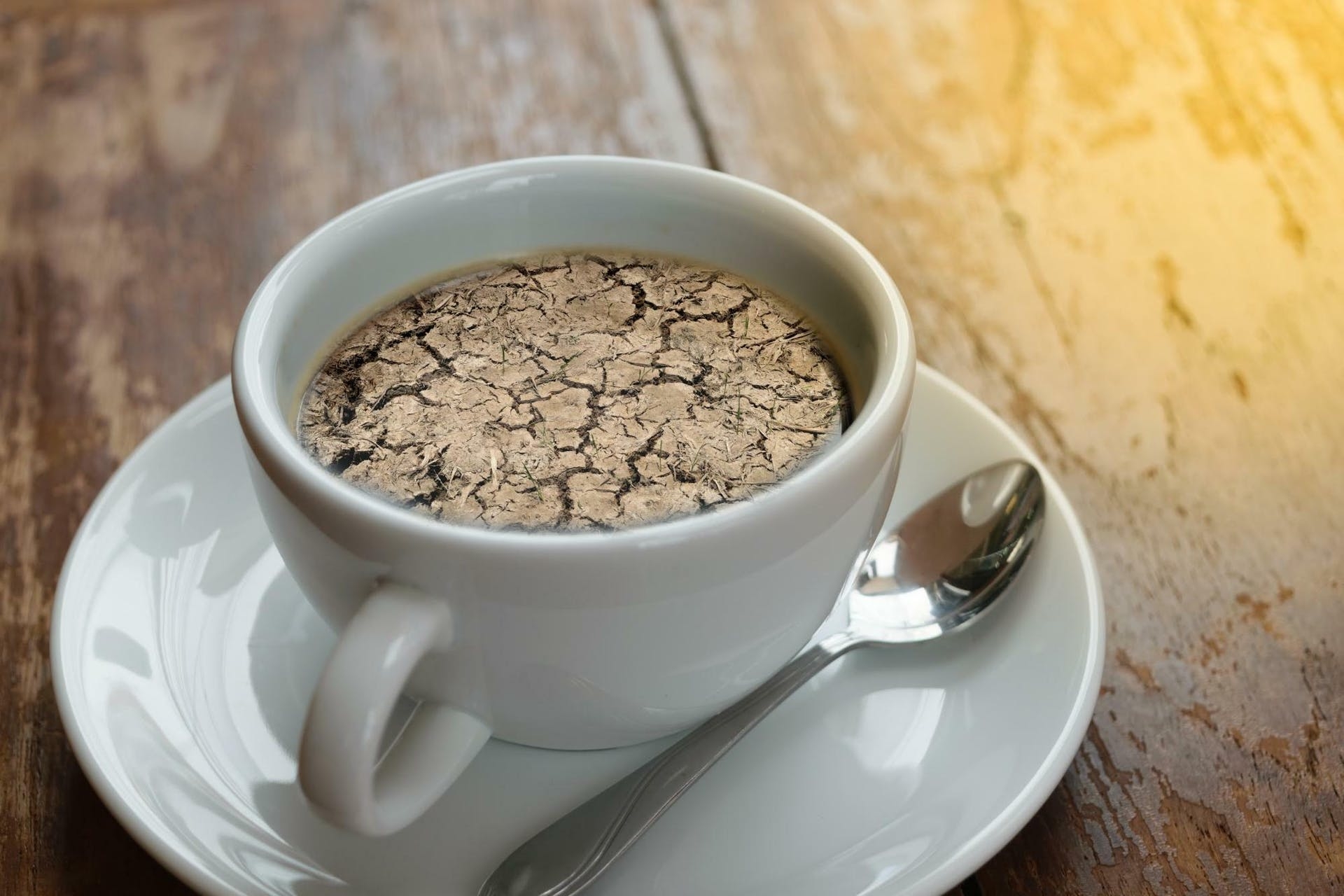 |
| Photo: Drip Drop |
If a cup of coffee sends you to the bathroom in a hurry, you’re not alone. Blame it on the caffeine. “Research indicates that caffeine can have a mild diuretic effect,” says Shanta Retelny.
Simply put: A diuretic is a substance that triggers your urge to pee. While studies haven’t unearthed the exact reason, caffeine can trigger the need to pee. “This may be more pronounced in those who are newer to drinking coffee,” Natalie King, a Chicago-based neuroscientist and medical science liaison.
Vancouver-based physician and scientific researcher Hélène Bertrand, MD, explains that caffeine “just makes your bladder more irritable” so that you feel the urge to pee sooner than you normally would.
Because drinking coffee might make you pee more often than usual, you might wonder if that means you’ll get dehydrated if you drink too much of it. First, you need to understand how much caffeine is in your cup of joe.
The caffeine content in different types of coffee
Different types of coffee contain different amounts of caffeine.
As a result, they may affect your hydration status differently.
Brewed coffee
Brewed or drip coffee is the most popular type in the United States.
It’s made by pouring hot or boiling water over ground coffee beans and is typically done using a filter, French press, or percolator.
An 8-ounce (240-ml) cup of brewed coffee contains 70–140 mg of caffeine or around 95 mg on average.
Instant coffee
Instant coffee is made from brewed coffee beans that are freeze- or spray-dried.
It’s simple to prepare, as all you need to do is mix 1–2 teaspoons of instant coffee with hot water. This allows the coffee pieces to dissolve.
Instant coffee has less caffeine than regular coffee, with 30–90 mg per 8-ounce (240-ml) cup.
Espresso
Espresso coffee is made by forcing a small amount of very hot water, or steam, through finely-ground coffee beans.
While it’s smaller in volume than regular coffee, it’s high in caffeine.
One-shot (1–1.75 ounces or 30–50 ml) of espresso packs around 63 mg of caffeine.
Decaf coffee
Decaf is short for decaffeinated coffee.
It’s made from coffee beans that have had at least 97% of their caffeine removed.
However, the name is deceiving — as it’s not entirely caffeine-free. One 8-ounce (240-ml) cup of decaf contains 0–7 mg of caffeine or around 3 mg on average.
Read More: How Much Caffeine In A Cup Of Coffee?
How much caffeine is in your favorite drinks & snacks?
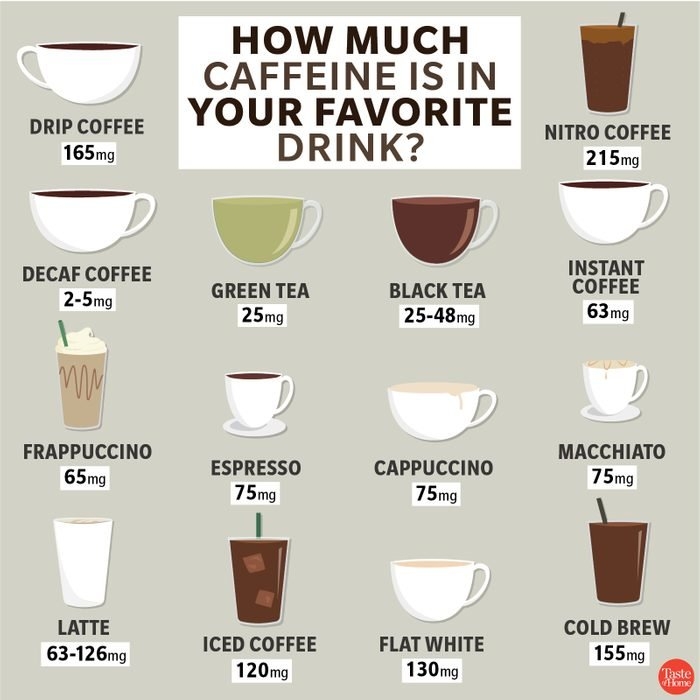 |
| Photo: Taste of Home |
Coffee, average (check the specific blend & café that you purchase from for specific levels):
Brewed, 8 oz. | 95 – 165 mg
Brewed, decaf, 8 oz. | 2 – 5 mg
Espresso, 1 oz. | 47 – 64 mg
Latte, 8 oz. | 63 – 126 mg
Dr. Pepper (12 oz) 37 mg
7 Eleven Big Gulp Diet Coke (32 oz) 124 mg
7 Eleven Big Gulp Coca-Cola (32 oz) 92 mg
Ben & Jerry’s Coffee Buzz Ice Cream (8 oz) 72 mg
Baker’s chocolate (1 oz) 26 mg
Green tea (6 oz) 40 mg
Black tea (6 oz) 45 mg
Excedrin (per capsule) 65mg
Should Drink More Water When You're Drinking CoffeeWe've covered that regular java guzzlers have a tolerance for caffeine's diuretic effects and that the brew can even count for some of your daily hydration needs. But if you're still feeling thirsty or are concerned about whether you're getting enough liquids, be alert to some key physical cues. Frankeny shares, "regardless of how much caffeine you drink, look for dehydration symptoms like thirst, weakness, dizziness, fatigue, reddened skin, and dry mouth." |
Facts About Caffeine
Caffeine is a stimulant and a diuretic. Because caffeine is a stimulant, it increases your blood pressure and heart rate, both of which are not recommended during pregnancy.
Caffeine also increases the frequency of urination. This causes a reduction in your body fluid levels and can lead to dehydration.
Caffeine crosses the placenta to your baby. Although you may be able to handle the amounts of caffeine you feed your body, your baby doesn’t have the enzymes needed to metabolize caffeine.
Any amount of caffeine can also cause changes in your baby’s sleep pattern or normal movement pattern in the later stages of pregnancy. Remember, caffeine is a stimulant and can keep both you and your baby awake.
Caffeine is found in more than just coffee. Caffeine is not only found in coffee but also in tea, soda, chocolate, and even some over-the-counter medications that relieve headaches. Be aware of what you consume.
Coffee is unlikely to dehydrate you
Though the caffeine in coffee may have a diuretic effect, it’s unlikely to dehydrate you.
For caffeine to have a significant diuretic effect, studies show that you need to consume more than 500 mg per day — or the equivalent of 5 cups (40 ounces or 1.2 liters) of brewed coffee.
A study in 10 casual coffee drinkers reviewed the impact of drinking 6.8 ounces (200 ml) of water, lower caffeine coffee (269 mg of caffeine), and high caffeine coffee (537 mg of caffeine) on signs of dehydration.
Researchers observed that drinking the higher caffeine coffee had a short-term diuretic effect, whereas the lower caffeine coffee and water were both hydrating.
In addition, other studies show that moderate coffee intake is as hydrating as drinking water.
For example, a study in 50 heavy coffee drinkers noted that drinking 26.5 ounces (800 ml) of coffee daily for 3 days was equally as hydrating as drinking the same amount of water.
Also, an analysis of 16 studies discovered that taking 300 mg of caffeine in a single sitting — equivalent to 3 cups (710 ml) of brewed coffee — increased urine production by only 3.7 ounces (109 ml), compared with drinking the same amount of non-caffeinated beverages.
So, even when coffee makes you urinate more, it shouldn’t dehydrate you — as you don’t lose as much fluid as you originally drank.
| Heavy Coffee Consumption It’s worth pointing out that one of the important confounding factors in all of the research on coffee and caffeine is whether you are ‘habituated’ to drinking coffee on a regular basis or not. Seemingly, the diuretic effects on regular coffee drinkers are much less pronounced than on those who have it infrequently, and abstaining from coffee consumption for as little as four days can reverse the adaptations that reduce diuresis markedly. |
Potential drawbacks of caffeine
Much of the published research about caffeine suggests that it is beneficial, in moderation.
However, some studies highlight the potentially harmful effects of caffeine.
Depression
A high caffeine intake may worsen symptoms of anxiety and depression.
Research published in 2016 found that, in 234 middle school students in Korea, a higher caffeine intake was linked to higher weight, lower academic achievement, and a higher risk of severe depression.
However, whether caffeine leads to depression or depression causes people to consume more caffeine remains unclear.
Blood sugar
People with type 2 diabetes report that their blood glucose levels rise after consuming caffeine.
There is some evidence that caffeine may impair insulin action, leading to a small but detectable rise in blood sugar levels, particularly after meals.
Pregnancy
Studies have suggested that more than 300 mg a day of caffeine, or the amount equal to around three cups of coffee, could lead to:
• loss of pregnancy
• delayed fetal growth
• abnormal fetal heart rhythm
According to the National Institutes of Health (NIH), the weeks before pregnancy also count. Research shows that if both parents consume more than two caffeinated drinks a day in the weeks before they conceive, a loss of pregnancy may be more likely.
Women should limit their caffeine intake to 200 mg or less during pregnancy.
Fertility
Some research suggests that caffeine may reduce muscle activity in the fallopian tubes, which carry eggs from the ovaries to the womb.
This could mean, say the study authors, that caffeine reduces a woman’s chances of becoming pregnant by about 27 percent.
Breast-feeding
Caffeine passes into breast milk in small amounts, and it may build up in the nursing infant.
Infants whose mothers drink large amounts of caffeinated beverages may be jittery and have trouble sleeping.
Gout
An additional intake of caffeine may trigger a gout attack in people with the condition.
Drinking six or more caffeinated beverages in 24 hours has been associated with an almost four-fold increase in the risk of recurrent gout attacks.
Incontinence
A study that looked at 1,356 women found that those with an intake of 329 mg of caffeine a day, equivalent to about three cups of coffee or more, had a 70-percent higher chance of bladder problems.
Insomnia
Consuming caffeine 3 and even 6 hours before bedtime can significantly disrupt sleep. Up to 6 hours before bedtime, caffeine can reduceTrusted Source objectively measured total sleep time by more than 1 hour.
Headaches
A population-based study found that dietary and medicinal caffeine consumption may be a modest risk factor for triggering chronic daily headaches, regardless of headache type.
Menopause
A study published in the journal Menopause found that women who consumed caffeine during menopause were more likely to have hot flashes and night sweats.
Facts About Coffee and Fitness
Coffee has long been studied for its potential performance-enhancing effects.11 In addition to helping you get through morning grogginess, coffee may also help you push through a grueling workout.
Because of its caffeine content, coffee is a great pre-workout beverage that can give you a mental and physical boost without the unwanted side effects that come with many pre-workout powders. (And no, it won't affect your hydration status during exercise if you drink it prior to your workout).4
Coffee may boost your fat-burning potential12 in addition to increasing your energy and mental focus. Combined, those three effects of coffee can give you a serious edge during your workouts.
Just remember that you can build up a tolerance to caffeine like you can any other stimulant. If you drink coffee as a pre-workout supplement, you may find yourself needing more and more to get the same effect. Just be sure to keep your caffeine intake below 400 mg per day which is the recommended limit for most healthy adults.
 How Much Caffeine In A Cup Of Coffee? How Much Caffeine In A Cup Of Coffee? Do you drink coffee everyday? Do you know how much caffeine you consume each day? Check out the measurement below to know. |
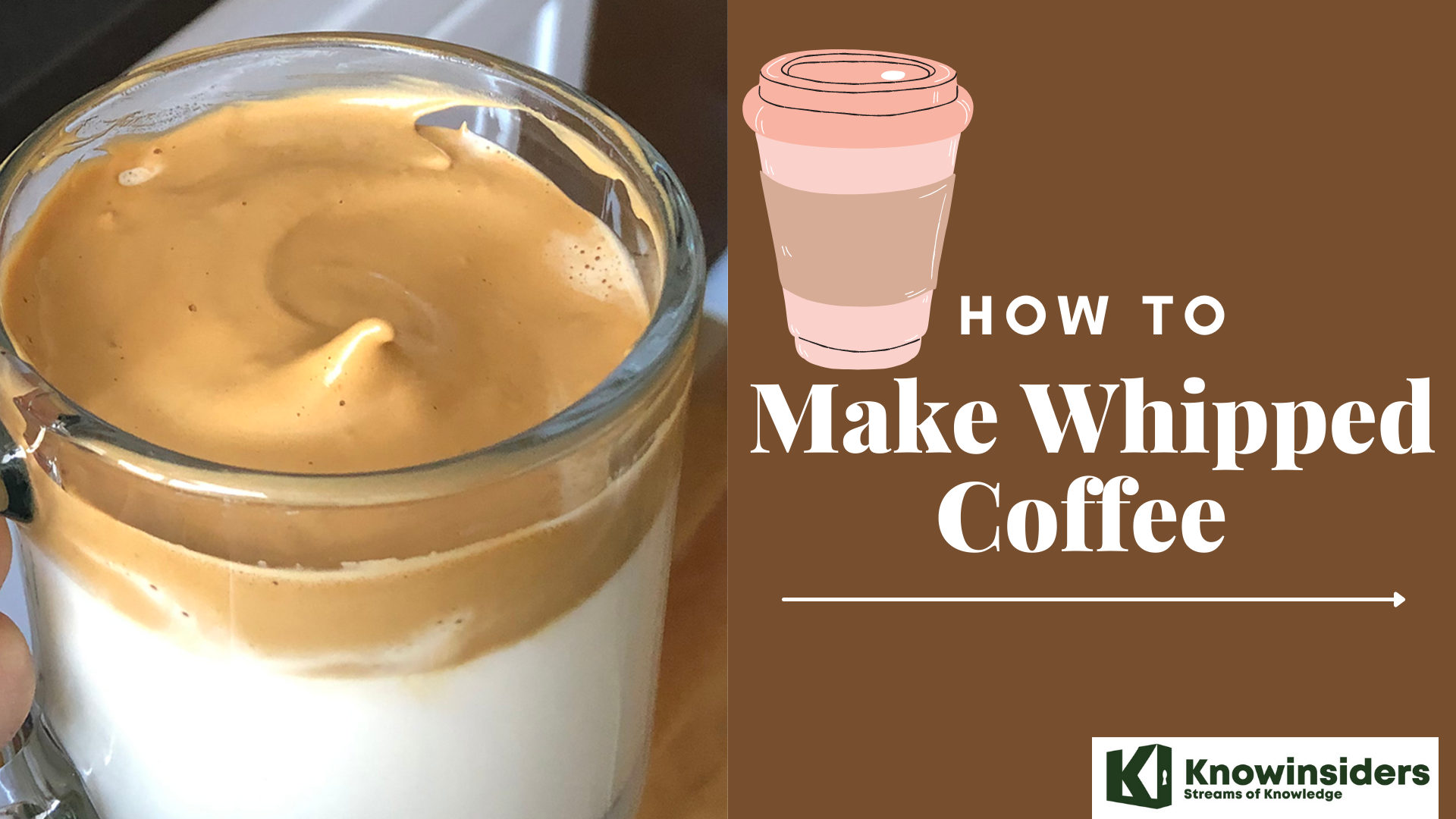 4 Easy Steps To Make Whipped Coffee or Dalgona Coffee 4 Easy Steps To Make Whipped Coffee or Dalgona Coffee To learn how to make whipped coffee as in the trend on TikTok, keep reading the article below. |
 Top 10 Largest Coffee Producing Countries In The World Top 10 Largest Coffee Producing Countries In The World Coffee beans, the raw material of the coffee beverage, have to grow somewhere. Which country produces the most coffee in the world right now? |

